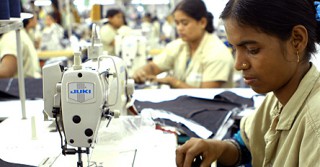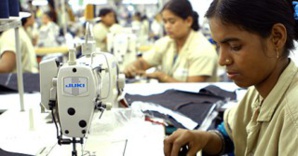Dailycsr.com – 22 February 2016 – In an announcement, Primark revealed its “new partnership” with the “Department for International Development”, whereby the duo will attempt to “improve” the conditions of the garment workers’ working place, especially those who are involved in “developing markets”.
In this endeavour of improving the wellbeing and the health of “local workers”, both the organisations will provide their expertise which in turn will also help the economic growth of the country besides alleviating “poverty in five of Primark’s key markets” like India, Bangladesh, Burma, Pakistan and Ethiopia.
The programme will provide “gender equality training in garment factories” and may other facilities like training up female nurses, as a “large part” of this initiate is to bring in a “positive change” in the women’s working conditions especially in the “developing world”.
Closely following in the heels of agriculture market, textile and fashion industry claims the second largest employer’s place in the developing markets, wherein many female workers are also taken in. As per research, educating these women will prove beneficial to their community in the long run.
In a global effort, led by the UK government, attempts are being made to “improve the rights and wellbeing of girls and women”, while DFID with its own initiative is working towards the betterment of girls and women” starting from their education, career, to “maternal and child” healthcare.
DFID and Primark have selected three key areas, “Women’s Economic Empowerment”, “Market development”, “Disaster response”, wherein they will concentrate to bring in transformation.
In the first field, they will support the empowerment of women in their health, gender equality, housing, skill development and career related issues. In the second area, the partnership will cultivate an “ethical and sustainable” work culture in the garment sectors of the developing markets and eventually:
“Primark and DFID will share lessons from response to the Rana Plaza disaster, including Primark’s work with local partners in Bangladesh to provide short-term and long-term support to the victims and their families”.
Paul Lister from Primark informs:
“At Primark, we are committed to ensuring that the people who make our products work in good conditions, are treated properly and paid a fair wage. That’s why we now have more than 60 people working for our Ethical Trade Team across our supply chain to ensure our high standards are met.
“We know that as well as ensuring worker rights are protected within the factories we work with, we can positively impact lives outside of the factory too. Whether it’s financial literacy, health education or helping workers understand their rights, we’ve seen that simple initiatives with local partners can make a huge difference.”
Talking about the new partnership, Paul adds:
“Our new partnership with DFID recognises the strength and depth of the work we have been doing across our supply chain. But, most importantly, it will help us use our expertise and resources already on the ground, to accelerate the impact of our programmes. In doing so, we are confident we will be able to make an even bigger difference.”
References:
http://www.primark.com/
In this endeavour of improving the wellbeing and the health of “local workers”, both the organisations will provide their expertise which in turn will also help the economic growth of the country besides alleviating “poverty in five of Primark’s key markets” like India, Bangladesh, Burma, Pakistan and Ethiopia.
The programme will provide “gender equality training in garment factories” and may other facilities like training up female nurses, as a “large part” of this initiate is to bring in a “positive change” in the women’s working conditions especially in the “developing world”.
Closely following in the heels of agriculture market, textile and fashion industry claims the second largest employer’s place in the developing markets, wherein many female workers are also taken in. As per research, educating these women will prove beneficial to their community in the long run.
In a global effort, led by the UK government, attempts are being made to “improve the rights and wellbeing of girls and women”, while DFID with its own initiative is working towards the betterment of girls and women” starting from their education, career, to “maternal and child” healthcare.
DFID and Primark have selected three key areas, “Women’s Economic Empowerment”, “Market development”, “Disaster response”, wherein they will concentrate to bring in transformation.
In the first field, they will support the empowerment of women in their health, gender equality, housing, skill development and career related issues. In the second area, the partnership will cultivate an “ethical and sustainable” work culture in the garment sectors of the developing markets and eventually:
“Primark and DFID will share lessons from response to the Rana Plaza disaster, including Primark’s work with local partners in Bangladesh to provide short-term and long-term support to the victims and their families”.
Paul Lister from Primark informs:
“At Primark, we are committed to ensuring that the people who make our products work in good conditions, are treated properly and paid a fair wage. That’s why we now have more than 60 people working for our Ethical Trade Team across our supply chain to ensure our high standards are met.
“We know that as well as ensuring worker rights are protected within the factories we work with, we can positively impact lives outside of the factory too. Whether it’s financial literacy, health education or helping workers understand their rights, we’ve seen that simple initiatives with local partners can make a huge difference.”
Talking about the new partnership, Paul adds:
“Our new partnership with DFID recognises the strength and depth of the work we have been doing across our supply chain. But, most importantly, it will help us use our expertise and resources already on the ground, to accelerate the impact of our programmes. In doing so, we are confident we will be able to make an even bigger difference.”
References:
http://www.primark.com/


 Primark In A Partnership With DFID To Improve Women Workers’ Condition In Developing Market
Primark In A Partnership With DFID To Improve Women Workers’ Condition In Developing Market





 Companies
Companies